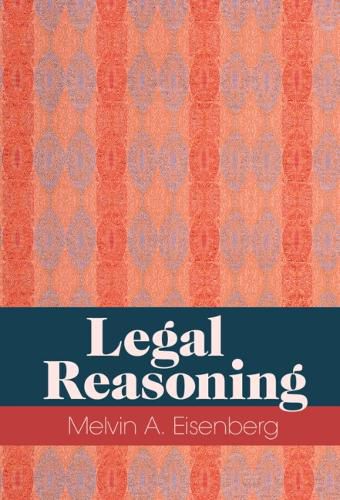Readings Newsletter
Become a Readings Member to make your shopping experience even easier.
Sign in or sign up for free!
You’re not far away from qualifying for FREE standard shipping within Australia
You’ve qualified for FREE standard shipping within Australia
The cart is loading…






This title is printed to order. This book may have been self-published. If so, we cannot guarantee the quality of the content. In the main most books will have gone through the editing process however some may not. We therefore suggest that you be aware of this before ordering this book. If in doubt check either the author or publisher’s details as we are unable to accept any returns unless they are faulty. Please contact us if you have any questions.
The common law, which is made by courts, consists of rules that govern relations between individuals, such as torts (the law of private wrongs) and contracts. Legal Reasoning explains and analyzes the modes of reasoning utilized by the courts in making and applying common law rules. These modes include reasoning from binding precedents (prior cases that are binding on the deciding court); reasoning from authoritative although not binding sources, such as leading treatises; reasoning from analogy; reasoning from propositions of morality, policy, and experience; making exceptions; drawing distinctions; and overruling. The book further examines and explains the roles of logic, deduction, and good judgment in legal reasoning. With accessible prose and full descriptions of illustrative cases, this book is a valuable resource for anyone who wishes to get a hands-on grasp of legal reasoning.
$9.00 standard shipping within Australia
FREE standard shipping within Australia for orders over $100.00
Express & International shipping calculated at checkout
This title is printed to order. This book may have been self-published. If so, we cannot guarantee the quality of the content. In the main most books will have gone through the editing process however some may not. We therefore suggest that you be aware of this before ordering this book. If in doubt check either the author or publisher’s details as we are unable to accept any returns unless they are faulty. Please contact us if you have any questions.
The common law, which is made by courts, consists of rules that govern relations between individuals, such as torts (the law of private wrongs) and contracts. Legal Reasoning explains and analyzes the modes of reasoning utilized by the courts in making and applying common law rules. These modes include reasoning from binding precedents (prior cases that are binding on the deciding court); reasoning from authoritative although not binding sources, such as leading treatises; reasoning from analogy; reasoning from propositions of morality, policy, and experience; making exceptions; drawing distinctions; and overruling. The book further examines and explains the roles of logic, deduction, and good judgment in legal reasoning. With accessible prose and full descriptions of illustrative cases, this book is a valuable resource for anyone who wishes to get a hands-on grasp of legal reasoning.